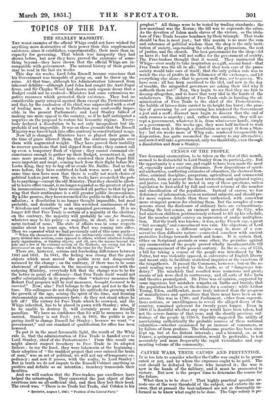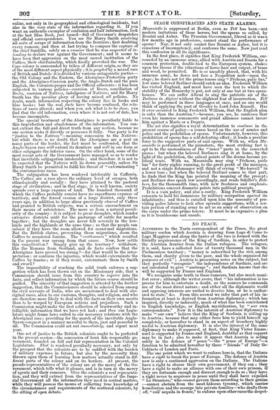CAFFRE WARS, THEIR CAUSES AND PREVENTION. IT is too late
to consider whether the Cafflo war ought to be prose- cuted or not, and by whom the expenses ought to be paid. The cost should be defrayed by those who incurred it; the war is now in the hands of the military, and it must be prosecuted to victory. But now is the proper time to determine the course for the future.
What then is to be done ? That highly practical question ar- rests one at the very threshold of the subject, and extorts the an- swer, that at present the best-informed are not so thoroughly in- formed as to know what ought to be done. The Cape colony ie pe- culiar, not only in its geographical and ethnological incidents, but also in the very state of the information regarding it. If you. want an authentic exemplar of confusion and half information, look at the last Blue Book, just issued—full of Governor's despatches and official correspondence. You see Sir Harry Smith receiving all sorts of scraps of information from the frontiers ; first doubting every rumour, and then at last trying to compass the capture of the chief Sandilla, solely on a rumour that he was suspected of in- tending to declare war against the Government ; and it seems to have been that aggression on the most sacred institution of the Caffres, their chieftainship, which finally provoked the war. The Cape colony is surrounded by tribes of different origin, as they are of the most different aspect physically ; it is peopled by a mixed race of British and Dutch: it is divided by various antagonistic parties— the Old Colony and the Eastern, the Aborigines-Protection party and the Aborigines-Coercion party, the Anglo-Dutch and the pure English, the Colonists proper and the Official adherents : it has been subjected to various policies—coercion of Boers, conciliation of Boers, coercion of Natives, indulgence of Natives ; and Sir Harry Smith has the peculiar glory of having mixed all policies. No doubt, much information respecting the colony lies in books and blue books ; but the real facts have become confused, the rela- tions of races altered; and when you ask what is to be done, you find that the old information, even where it is not out of date, 'has become incomplete. The special treatment of the Aborigines is peculiarly liable to this imperfection and obsoleteness of the information. You can- not extract the full and direct truth from any section, because no one section seeks it directly or possesses it fully. One party is for " justice to the Natives "—meaning concession to the Natives : but while there is no doubt that the Aborigines are a pest on many parts of the border, the fact must be confronted, that the Anglo-Saxon race will extend its frontiers and will in one form or other subjugate the inferior races. On the other hand, some of the most recent acts of the Government have managed so as to render that inevitable subjugation intolerable ; and therefore it is not to be expected that the Natives will lie down peaceably, unless Sir Harry Smith be permitted to fulfil his threat of " exterminating " the contumacious races.
The subjugation has been rendered intolerable in Caffraria. The Caffres are a race above the ordinary level of savages, both ethnologically and socially : they have attained to the pastoral stage of civilization ; and in that stage, it is well known, society spreads over a large expanse of land. The hundred thousand of which the Caffres probably consist have no superfluous expanse of territory, and the forced cession of a large district, only three years ago, in addition to large slices previously cleared of Caffres and granted to British subjects, was a serious encroachment on their means of subsistence. The more so from a natural peculi- arity of the country : it is subject to great droughts, which render extensive districts unfit for the pasturage of cattle for months together ; but the droughts are never felt severely in the low- lands and the highlands at the same time ; so that the people can subsist if they have the room allowed for occasional migrations. But the British claims, preventing those migrations, doom the Caffres to occasional famine. The "restlessness" which resulted in the present war sprung from that cause. Now, how settle this complication ? Simply give up the territory ? withdraw, like the Romans from Scotland, and de facto confess that the Aborigines have proved too strong?—for that would be the inter- pretation : or continue the injustice, which would exterminate the Caffres by famine; or if they resist, exterminate them by Smith and sword?
The impossibility of reaching the solid truth enforces a sug- gestion which has been thown out on the Missionary side, that a Commission should issue from this country to inquire into the facts, and collect information by which the future course should be guided. The sincerity of that suggestion is attested by the further suggestion, that the Commissioners should be selected from among the civil servants of India, who are accustomed to deal with abo- riginal races, alien to our customs, thoughts, and religion, and who are therefore more likely to deal with the facts on their own merits than to be warped by European notions and prejudices. Such a Commission might make the first collection of trustworthy and in- telligible information that we have yet had ; and then our Legis- lature might frame laws suited to our necessary relations with the Aboriginal race ; providing for the march of the inevitable Anglo- Saxon conquest in a manner merciful to them, just and peaceful to all. The Commission could set out immediately, and report next year.
One act of justice to the British colonists ought to be perfected is the present session—the concession of bona fide responsible go- vernment, founded on full and fair representation in the Colonial Legislature. That is rendered peculiarly necessary, not only by the prospect that the colonists are to be saddled with the burden of military expenses in future, but also by the necessity thus thrown upon them of learning how matters actually stand in dif- ferent parts of the colony and on its borders. At present, the pseudo-representatives of the colony are at the mercy of the Go- vernment, which tells what it pleases, and is in turn at the mercy Of agents and their rumours. Give the colonists a real representa- tion, and they will extract from the representatives of the Impe- rial Government all the information they need in central matters, *Mk they will possess the means of collecting true knowledge of the circumstances and requirements of the scattered colonists, by the sifting of open debate.



























 Previous page
Previous page